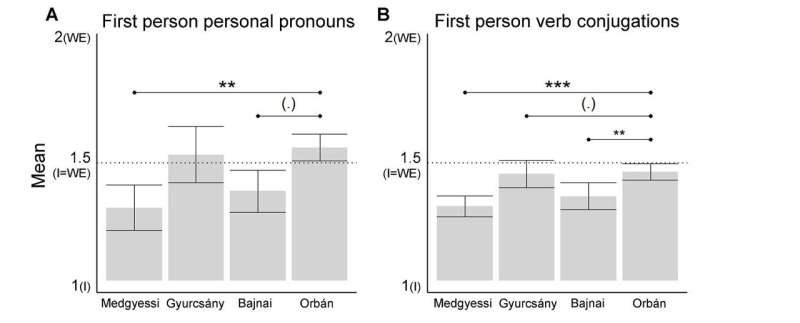Study reveals personality change in speech patterns of Hungarian prime ministers

Hubris syndrome, a personality disorder describing successful political leaders being spoiled by their sustained experience of excessive power, received attention with the rise of populism. Marks of the syndrome can be traced in particular speech features, which researchers use as linguistic biomarkers of the syndrome.
A recent study in PLOS One titled "The Hungarian Hubris Syndrome" analyzed the characteristic language patterns in spontaneous parliamentary speeches of four Hungarian PMs between 1998 and 2018. While linguistic markers of the hubris syndrome have been described exclusively in English so far, this new study by Lilla Magyari (Department of Social Studies and Norwegian Center for Reading Education and Research, University of Stavanger, Norway), Csaba Pleh (Central European University, Austria) and Balint Forgacs (Institute of Psychology, Eotvos Lorand University, Hungary) looks at a non-Indo-European language, Hungarian.
"Among prime ministers of Hungary, Viktor Orban has been in power for the longest period since the fall of the Iron Curtain between 1998 and 2002 and since 2010 to this day, which makes him particularly vulnerable to the hubris syndrome," says Csaba Pleh. "It has also been suggested that subsequent reelections might increase the chance for hubris. Orban's political behavior and leadership style from his second term onward, when he obtained a supermajority providing him excessive power, is consistent with this idea."
Researchers looked at spontaneous speeches of all Hungarian PMs who governed between 1998 and 2018. To avoid speeches by professional speech writers, transcripts of public speeches at plenary sessions of the Hungarian Parliament were examined.
The researchers analyzed the following categories of speeches: (1) two-minute interventions: a remark during general debates with permission from the Speaker of the House (2) reply: reply by the speaker during general debate (3) re-replies: one-minute re-replies to replies by speakers to so called immediate questions. Altogether 454 replies and interventions were selected from the four PMs through seven parliamentary cycles from 1998 to 2018.
"Our study explores characteristic language patterns of Hungarian PMs with a special emphasis on one of the key indicators of hubris, the shift from the first person 'I' to 'we' in spontaneous speech," says Lilla Magyari. "We analyzed the ratio of the first-person singular ('I') and plural ('we') pronouns and verbal inflections and found that Viktor Orban during his second premiership used first person plural relative to singular inflections more often than the other three PMs during their terms. He and PM Ferenc Gyurcsany, who were re-elected at some point showed an increased ratio of first-person plural vs. singular inflections and personal pronouns by their second term, likely reflecting increasing hubristic tendencies. The results show that the ratio of 'I' and 'we' usually studied in English texts also show changes in a structurally different language, Hungarian."
According to the study, besides the experience of excessive power, extended periods of premiership may also increase hubristic behavior in political leaders. "The results are particularly elucidating regarding the role of re-elections in political leaders' hubristic speech and behavior," concluded Balint Forgacs.
More information: Lilla Magyari et al, The Hungarian hubris syndrome, PLOS ONE (2022). DOI: 10.1371/journal.pone.0273226
Journal information: PLoS ONE
Provided by Central European University


















